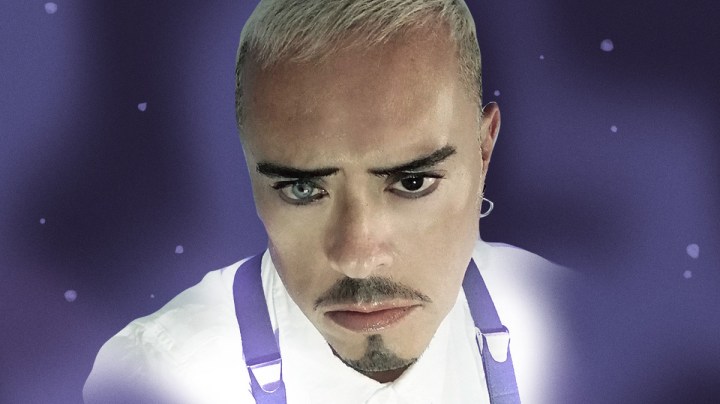Remembering Mateo Lafontaine, a Larger Than Life Figure in the Mexican Electronic Scene

Art by Stephany Torres for Remezcla.
On Thursday (October 29), the Mexican musician known as Mateo Lafontaine died in Mexico City at the age of 58. The news was made public by his brother, musician and journalist Mario Lafontaine. No cause of death has been revealed yet although word about his poor health had been made public in recent months.
Lafontaine is best remembered for his work with Década 2. Formed in 1985, a few months after the devastating earthquake that shook Mexico City, the band was formed by Lafontaine and former Silueta Pálida member Carlos García. Década 2 played electronic dance music that skewed to the dark side, taking influences from industrial, EBM, and minimal synth; the sound helped build “La Voz,” a concept that mixed socio-political commentary with grim futuristic themes, and a dark sense of humor coupled with a visual side that relied on Soviet iconography and the work of Lance Wyman for the Mexican Olympics in 1968. The project kept active throughout the years even as García stepped down in recent time; Década 2’s last release was the single “Nunca es tarde para saludar al futuro,” released in September 2020.
Throughout the years, Lafontaine built one of the biggest synths and electronic instruments collection in the country, joking that he would only sell his gear when he died to pay for the funeral expenses.
Born Juan Carlos González in Mexico City, Lafontaine fell in love with synths thanks to his father and older brother’s love of early electronic composers, like Wendy Carlos and Isao Tomita as well as Kraftwerk who captured his imagination. He bought his first pieces of electronic gear from other pioneers like Capitán Pijama and Size. Lafontaine formed his first project Old Fashioned in 1982, which became Volti the following year. In 1984, he formed María Bonita with his brother Mario, mixing electronics, performance art, absurdist humor and cabaret music, becoming a fixture of the countercultural nightlife and LGBT+ scene of the time. In addition to his musical contributions, Lafontaine was also an accomplished graphic designer, working on cover art and logos of contemporaries like Size and Syntoma.
In 2014, Yo Soy La Voz, a documentary on Década 2 was announced, but never screened. Some clips of it are available on the project’s YouTube channel, but remains unreleased and little is known about its status. On Saturday (Oct. 31), Mario Lafontaine announced that there’s a forthcoming double-LP vinyl of Década 2 material on the way, as well as a María Bonita EP and a memoir. Further details are TBD.
Mateo Lafontaine will be remembered for pushing the limits in the Mexico City underground scene, uniting experimentation with pop sensibilities, and quietly amassing one of the most spot-on discographies in the country’s electronic music. A larger than life figure with stories and jokes for days. He will be missed.